Rotary tools are incredibly versatile. They’re essentially high-speed motors with variable-speed triggers housed inside a casing. Users can swap bits and attachments in and out to allow these tools to cut, grind, sand, polish, shape, route, and perform more functions, all from one compact, lightweight tool. They have adjustable speeds, plenty of available accessories, and even flexible power options.
Because so many low-quality, inexpensive rotary tools exist on the market, I want to help you avoid the pitfalls of choosing the wrong tool. This guide will explain everything you need to know to choose the best rotary tool. Moreover, it will highlight some of our favorite models for your consideration.
Our Top Picks
- Best Overall: Dremel 4300-5/40 – Buy from Acme Tools
Jump to this Rotary Tool ↓ - Best Cordless: Dremel 12V Cordless 8240 – Buy from Acme Tools
Jump to this Rotary Tool ↓ - Best for Cutting Metal: Milwaukee M12 Cordless 2460-20 – Buy from Acme Tools
Jump to this Rotary Tool ↓ - Best Wood Carving: Dremel 4000 Corded Rotary Tool Kit – Buy on Amazon
Jump to this Rotary Tool ↓ - Best Flex Shaft: Dremel 9100-21 Fortiflex 2.5 Amp Flex Shaft – Buy from Acme Tools
Jump to this Rotary Tool ↓ - Best Heavy-Duty: Bosch Professional GRO 12V-35 – Buy on Amazon
Jump to this Rotary Tool ↓
Also In This Article
How We Picked the Best Rotary Tools
We have a ton of experience with rotary tools. In fact, we’ve tested them several times in the past, and we’ve been using them for a variety of projects for decades. In short, we know what to look for in these tools, but we also know there are a lot of low-quality tools on the market. We worked hard to make sure our readers knew what to look for.
The first thing we did was consider all of the features we thought the average user would need, including variable speeds, the different accessories, and the amount of power a proper rotary tool requires. Then, we thought of all the tools one could use a rotary tool on, both DIY and professionally. This gave us a great baseline by which to find tools we thought would meet our needs.
Once we had a selection of tools to compare, we pitted them against each other. We compared them based on portability, convenience, included accessories, capabilities, speed, and value. We also took into consideration which projects each tool would be best suited for, which might’ve come down to power, portability, or even the accessories included.
Tools from companies that we find reputable were also given precedence over brands that have underperformed in the past. The tools that offered enough value and flexibility were given awards while those that didn’t were removed from the list.
Best Overall Rotary Tool
Dremel 4300-5/40
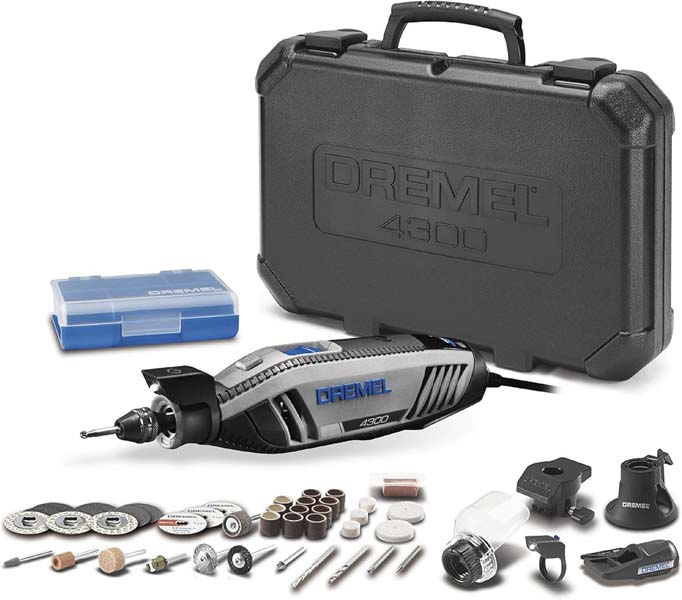
When it comes to finding the best overall rotary tool, it’s hard to beat the Dremel 4300. This model features a 1.8-amp motor that spins at speeds between 5,000 and 35,000 RPMs, allowing it to be as flexible as possible. It also comes with a 40-piece set of accessories and wheels for cutting, grinding, sanding, polishing, and more, as well as 5 collars designed for a wide range of purposes (drywall, edge sanding, shield, pivot light, and garden tool sharpening).
This model has plenty of additional features to talk about. It has a comfortable grip (though some might find this model a bit bulky), as well as a keyless chuck that allows users to remove and replace bits quickly and easily. It comes with a carrying case and a case for all the bits and wheels, all of which combine to make this the best Dremel tool available.
Features
- Power Source: Corded
- Top Speed: 35,000 RPM
- Accessories: 40-piece set, carrying case, accessory case, attachable collars
Pros
- Speed adjusts between 5,000 and 35,000 RPM for maximum flexibility
- Comes with 5 attachments to allow for a wide range of functions
- Features a keyless chuck to make swapping between bits faster
Cons
- Some crafters and DIYers might find it slightly bulky
Price: $124.99
Best Cordless Rotary Tool
Dremel 8240 Cordless 12V Rotary Tool

The Dremel 8240 is a great rotary tool for taking grinding, polishing, or cutting wherever you need to. This tool runs on a 12-volt rechargeable battery. The included battery features a 2.0Ah rating, allowing for plenty of run time for most needs. The motor has a maximum speed of 35,000 RPM, but it can run at speeds as low as 5,000 RPM, providing a wide speed range for plenty of flexibility.
One downside to this kit is that it comes with a limited number of accessories. It only comes with a handful of sanding drums, a cutting wheel, a battery, a charger, and a flexible shaft attachment. The flex shaft attachment is quite handy though, as it can handle a range of angles and situations.
Features
- Power Source: Cordless 12V
- Top Speed: 35,000 RPM
- Accessories: Sanding drums, cutting wheel, flexible shaft, carrying case
Pros
- Features a 12V, 2Ah battery for cordless operation
- Comes with a flexible shaft attachment for working in a variety of positions
- Maximum speed of 35,000 RPM is impressive for a cordless model
Cons
- The included accessories are relatively limited
Price: $99
Best Rotary Tool For Cutting Metal
Milwaukee M12 Cordless Rotary Tool 2460-20
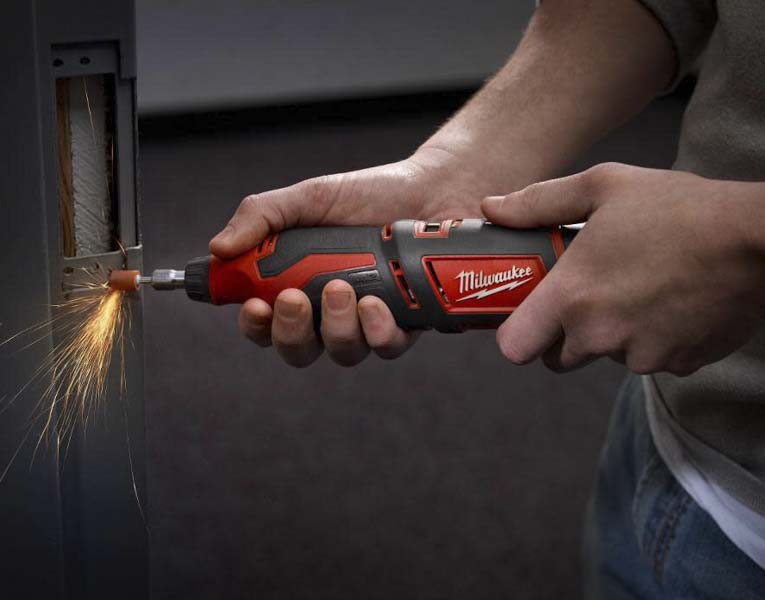
Metal cutting can sap a cordless rotary tool’s battery quickly, but the Milwaukee M12 Cordless Rotary Tool has the answer. This model comes with two batteries. The first is a 2.0Ah model, which will easily handle most jobs. The second battery is a heavy-duty 4.0Ah battery, allowing this model to cut for a long time before needing a swap. And, because it’s cordless, this model can go anywhere it’s needed, making it a true contender for the best Dremel alternative.
The 12V Milwaukee Cordless Rotary Tool features a slick, comfortable design. It has plenty of rubber texture for control and comfort, and the on-off switch and speed dial are easy to operate. The only issue one might find with this kit is that it doesn’t come with all of the accessories one might expect at this price point—just a handful of cutting wheels.
Features
- Power Source: Cordless 12V
- Top Speed: 32,000 RPM
- Accessories: Just five cutting wheels
Pros
- Comes with two batteries, one of which is a 4Ah battery for cutting for extended periods
- Cordless design allows it to go anywhere it’s needed
- Plenty of rubber around the case for comfort and control
Cons
- The accessory kit is limited
Price: $99
Best Rotary Tool For Wood Carving
Dremel 4000 Corded Rotary Tool Kit
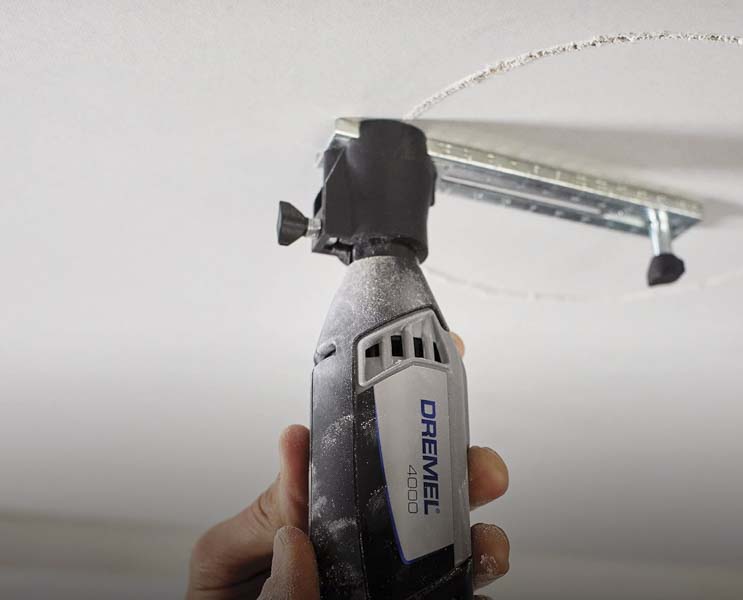
New and experienced wood carvers alike will appreciate the Dremel 4000 Corded Rotary Tool Kit. This kit comes with just about everything someone would need to get started carving. It features several carving bits and sanding drums. It also comes with several accessory collars, one of which is a pistol grip which can add a level of control necessary to create detailed carvings, making this the best Dremel kit for crafts and carving.
This model features a 1.6-amp electric motor with a feedback feature that controls the output for consistent performance. It runs at speeds between 5,000 and 35,000 RPM as well, allowing this rotary tool to be handy for carving everything from softwood to exotic hardwoods. And, while it doesn’t have a keyless chuck, an upgrade kit can be purchased to make this tool even more convenient and capable.
Features
- Power Source: Corded
- Top Speed: 35,000 RPM
- Accessories: 86-piece set, carrying case, accessory case, accessory collars
Pros
- It comes with several carving bits, a pistol grip attachment, and sanding accessories
- Speeds adjustable between 5,000 and 35,000 RPM for a range of wood materials
- Feature feedback circuitry to provide consistent performance
Cons
- It doesn’t have the keyless chuck (though it can be upgraded)
Price: $99.99
Best Flex Shaft Rotary Tool
Dremel 9100-21 Fortiflex 2.5 Amp Flex Shaft Powerful Rotary Tool Kit
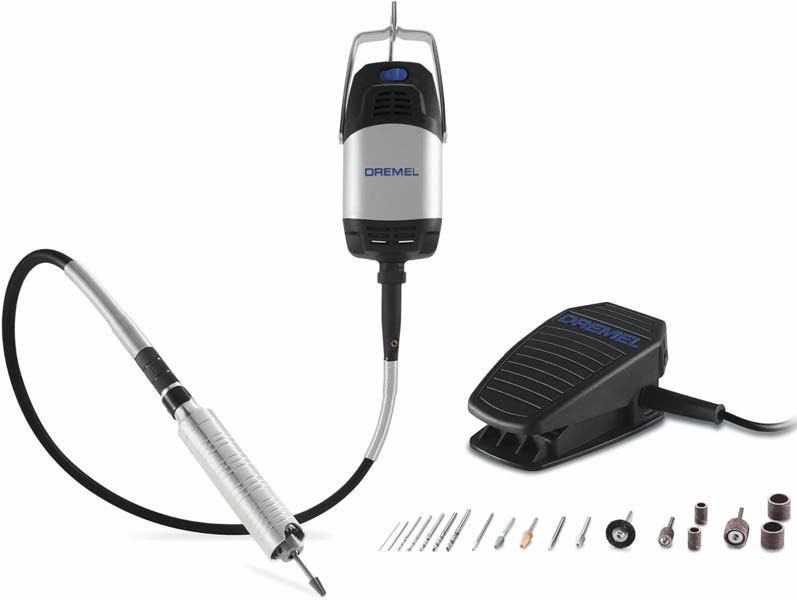
When it comes to keeping the work area clear without sacrificing capability, a flex shaft rotary tool like the Dremel 9100-21 Fortiflex is a great choice. This model features a three-piece design, including the rotary tool, the motor, and the foot pedal. Users can hang the motor on a hook or bracket and control the speed with the foot pedal. This helps keep the workspace clean while also providing a lightweight, easy-to-control handle.
The motor features a 2.5-amp rating, making it a heavier-duty option than most other rotary tools and the most powerful Dremel on the list. Its speed ranges between 0 and 23,000 RPM. It also comes with several carving and engraving bits, sanding drums, and more, totaling 21 pieces overall.
Features
- Power Source: Corded
- Top Speed: 23,000 RPM
- Accessories: Foot pedal, 21 accessories, flexible shaft design
Pros
- Features a flexible shaft design that the user can control with the included foot pedal
- Features a 2.5-amp motor for plenty of torque when grinding or sanding
- Motor features a hook design that can hang from the wall to keep the workspace clean
Cons
- The foot pedal may take some getting used to at first
Price: $219.99
Best Heavy-Duty Rotary Tool
Bosch Professional GRO 12V-35
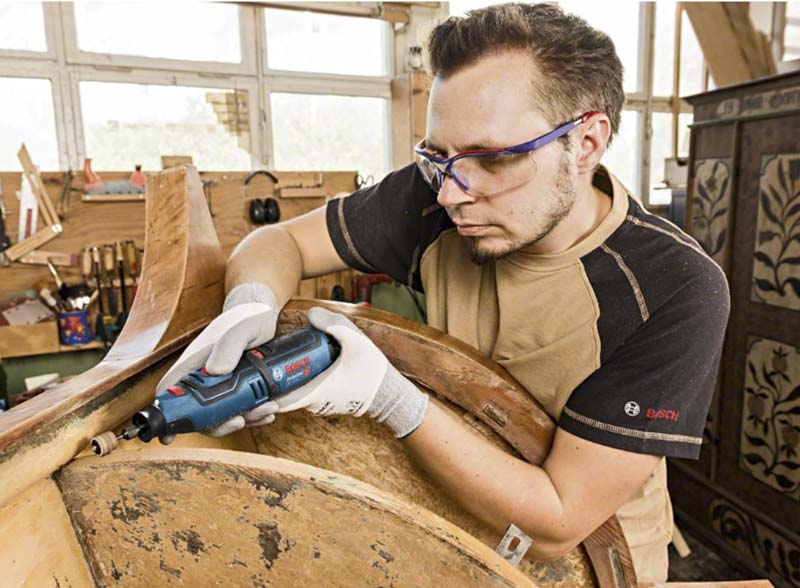
Bosch’s Professional GRO 12V-35 is a pro-grade cordless rotary tool worth considering. This model features a heavy-duty motor capable of handling a wide range of uses. This high-speed rotary tool operates at speeds between 5,000 and 35,000 RPM, allowing it to cut, sand, polish, or grind most materials on a construction project. It features an internal speed regulator that monitors and controls speed for consistent performance, as well.
This model doesn’t come with any accessories or batteries, but it does come with a heavy-duty case to protect it. But for pros already invested in the Bosch 12V line, they’ll be able to make great use of their batteries with this rotary tool.
Features
- Power Source: Cordless 12V
- Top Speed: 35,000 RPM
- Accessories: Just a case
Pros
- Spins at speeds up to 35,000 RPM for plenty of power
- Features a speed regulator that monitors and controls speed
- Cordless portability for convenience despite heavy-duty power
Cons
- It doesn’t come with any accessories or batteries
Price: ~ $320
From our Please Don’t Try This at Home department: Can You Use a Rotary Tool as a Dental Device???
Best Rotary Tool Buying Guide
Let’s face it: it doesn’t take much for a company to install a cheap electric motor in a plastic housing and call it a rotary tool. For that reason, there are some things you need to know about rotary tools before you just pick up the first tone on sale. The following are some of the most important considerations to keep in mind when looking for the best rotary tool.
Power Source
Corded vs. Cordless
There are two main types of rotary tools: corded and cordless. Corded tools use power supplied from an electrical outlet. They need to be plugged in to run, which does tether the user to the power outlet. However, they never run out of power, they’re inexpensive, and many are slightly more heavy-duty than cordless models.
Cordless models are all about convenience. These tools use rechargeable batteries to power their electric motors. There aren’t any cords to trip over and the user can take them anywhere. Some of these models are slightly less powerful than corded models, which could be a drawback for some folks, and long carving projects might require a few batteries. They’re also more expensive than corded models, but heavy-duty versions are well worth the price.
Battery Life (for Cordless Models)
For some cordless rotary tools, battery life can be an issue. Battery capacity is described in terms of amp hours (Ah), with the higher amp-hour ratings indicating longer run times. Most rotary tools use smaller batteries, so Ah ratings in the 1.5 to 2 range are usually sufficient.
The truth is that the higher the speed of the motor is set and the more friction caused on the bit, the more battery power the tool will use. For quick cutting, drilling, or polishing, this is rarely an issue. But for long projects, users may want to get a spare battery or opt for a corded rotary tool.
Speed Range and Control
Variable Speed Options
Most rotary tools have variable speed settings that users can adjust according to the project they’re working on. Polishing and aggressive sanding can require higher speeds than drilling or even cutting, in some cases. It depends on the material at hand, and since rotary tools are so versatile, their speeds must be adjustable.
Maximum RPM Ratings
Maximum RPM explains how fast the rotary tool can run under zero load, which means without a bit and set at max speed. Some models can reach 35,000 RPM, while others might be more in the 20,000 to 25,000 RPM range. It’s important to note that once the tool is cutting, grinding, sanding, or polishing, it won’t be able to achieve its maximum rated top speed. However, this is a helpful benchmark for determining how fast a rotary tool is compared to others.
Attachments and Accessories
Compatibility with Universal Attachments
Most rotary tools have a three-jaw clamp similar to a power drill. These are also known as collets. These collets allow the user to install a wide range of universal rotary bits, which typically have between 1/32 and ⅛-inch shaft diameters. Typically speaking, anything larger than that will not fit in a rotary tool.
Some models also have keyless chucks, which allow users to swap the bits and attachments without the use of a wrench or key.
Included Accessories vs. Additional Purchases
Most rotary tools come with a basic set of accessories. This usually includes a few cutting wheels, sanding discs and drums, sharpening stones, and polishing wheels. However, there are additional accessories available that can truly expand a rotary tool’s flexibility.
For instance, some rotary tools have LED-lit collars that can attach to illuminate the project. Others might be compatible with a drill press attachment. There are also kits with 100 pieces or more of cutting discs, grinding wheels, polishing wheels, wire wheels, and other attachments that users can buy specifically for high-speed rotary tools. Some even have quick-change tips that allow the user to swap out the wheel in seconds.
Ergonomics and Design
Grip Comfort
The typically rotary tool project takes a bit of time, whether it’s sharpening, carving, polishing, or cutting, so the grip should be comfortable. A rubber over-mold grip can help reduce vibration and prevent the user from tiring. It also provides plenty of grip for the user just in case the rotary tool kicks slightly. Some models might earn extra points for having easily accessible buttons and dials for turning the motor on and adjusting speeds.
Weight and Ease of Use
The lighter the rotary tool, the easier it will be to use. Most rotary tools are well under two pounds, which should be comfortable for most users. Only older models will typically be much heavier than that, or models with large replaceable batteries. But if weight is a concern, make sure to choose a lighter model from a reputable brand.
Brand and Warranty
Reputable Brands
Let’s discuss the elephant in the room: Dremel. Dremel is the undisputed leader in rotary tool production, and it’s for good reason. The rotary tool as we know it was created by Albert J. Dremel in the 1930s. Rotary tools are so synonymous with Dremel that many DIYers and pros refer to these tools by the Dremel name, even if other manufacturers make them.
And there are many other manufacturers, too. Dewalt, Milwaukee, Makita, and other popular power tool brands make rotary tools. Most of the products by these brands are high-quality and sufficient for DIYers and light-use by pros. However, many of these brands also build tools known as die-grinders, which are not the same and don’t use the same accessories, so shoppers need to be aware of what they’re buying.
Warranty Periods and Coverage
Reputable brands will offer customers two to three years of warranty coverage for their rotary tool. If anything stops working, the customer can typically send the tool back to the manufacturer for a repair or replacement. The one exception to the warranty is batteries—they’re rarely covered after the first few weeks.
Uses of Rotary Tool
Rotary tools are extremely versatile, with many practical uses. The following are some of the most common uses for rotary tools and their attachments.
Engraving and Carving
Crafters and carvers love rotary tools because they’re fast and efficient. They often come with bits designed to make carving, scrollwork, and other embellishments simple and easy. They can be used for wood, metal, glass, stone, and a wide variety of other objects.
Sanding and Polishing
Rotary tools are great for sanding, polishing, and even sharpening. They often come with the attachments required, including sanding drums with varying grits, polishing wheels, and sharpening stones. They can restore wood material, cutlery, tools, and other objects around the home and workshop.
Cutting Drywall
Rotary tools are great for drywall work. When outfitted with the correct drywall-cutting spiral bit and collar, they can make accurate and fast drywall cutouts around outlets, pipes, junction boxes, and even around windows and doors.
Removing Rust and Paint
Rotary tools do a great job of removing corrosion and paint. With a wire wheel chucked into the collet, users can crank up the speed and remove paint, dirt, dust, rust, and all sorts of other grime from a wide variety of surfaces. This makes rotary tools very helpful for prep work and repairs.
Jewelry Making
When it comes to cutting and shaping stones, glass, or even carving wood for jewelry, rotary tools are extremely handy. These are small tools that don’t take up a lot of space on a crafting bench, but they’re powerful enough for almost anything a jewelry maker could need them for.
Woodworking Details
As mentioned, one of a rotary tool’s greatest strengths is its ability to quickly and carefully carve wood. Woodworkers can use their rotary tools to add scrollwork and carve details into their projects, taking a basic project up several notches quickly, without a huge investment.
Safety Considerations When Using a Rotary Tool
Though rotary tools are compact and relatively inexpensive, it’s important to remember that their bits, wheels, and discs spin at extremely high speeds, so they can be dangerous. The following are some important safety considerations to keep in mind when using a rotary tool.
Eye Protection
The most important piece of PPE that a rotary tool user should don is a pair of safety glasses. Rotary tools can send small bits of material flying. Their discs can also snap and fly off the end of the tool at high speeds. Protecting your eyes with a pair of safety glasses is an absolute must.
Respiratory Masks
Any tool that spins when it polishes, sands, or cuts is going to create some airborne particles. It’s a wise idea to avoid breathing these in, so wear a respirator mask to keep them out of your nose, mouth, and airways.
Ventilation
Depending on what you’re working on, ventilation could be a smart move. Exhausting the air from the workshop can keep the user from accidentally inhaling dust, paint particles, rust, and all sorts of other airborne particles. A fan in a window will help drag the particles away from the user. Dust collection is also an option, including makeshift collection using a wet/dry vacuum.
Clutter-Free Environment
It’s also a good idea to keep the work environment as clean and clutter-free as possible. This is especially the case when working with corded tools, as cords can wrap around items and cause spills, trips, and other accidents.
Regular Inspection
Be sure to inspect your rotary tool regularly. Be sure that the collar snugs down tightly on the bit, and that there aren’t any frays in the wire. Any cracks in the housing or signs of damage should also be noted so the tool can be sent back to the manufacturer for repair. Remember, these are small but high-speed tools, so they must be as safe as possible.
Proper Storage
Almost all rotary tools come in a carrying case or box of some sort. Use these containers when the tool isn’t in use. This will protect them from accidental damage while also keeping all of the bits and wheels organized. Make sure to remove any bits from the collar to prevent accidentally bending or breaking anything when closing the case.
Frequently Asked Questions About Rotary Tools
What is the difference between a rotary tool and a Dremel?
Rotary tools are power tools that spin bits and wheels at high speeds. Dremel is a brand that makes rotary tools. Dremel is so popular, however, that many folks refer to all Dremel-type tools as “dremels.”
Can I use a rotary tool to cut metal?
Rotary tools are capable of cutting light-duty metal for smaller metalworking repairs and projects. However, they’re typically not powerful enough for thicker steel such as vehicle and trailer frames.
How do I maintain my rotary tool?
Maintain your rotary tool like you would any other power tool. Keep it clean, bloat off any dust and debris, and store it away in its case. Be sure to inspect it before every use and if there are any issues, do not use the tool.
Are rotary tools safe to use for beginners?
Rotary tools are versatile, high-speed tools, but they’re also beginner-friendly. With the right safety precautions and an understanding of these tools’ limitations and uses, beginners can safely operate them.
Can rotary tools be used for professional purposes?
Rotary tools do have some professional uses. Pros who need to grind away small bits of metal, trim drywall around an outlet, or even sharpen their tools throughout the day will find rotary tools very handy.
Why You Can Trust Pro Tool Reviews
Ever check out a “review” site and you can’t tell if the author has any real experience with tools or if they’re just “recommending” the Amazon top sellers? That’s not us. We won’t recommend anything unless we’d use it ourselves. It’s all about giving you a legitimate recommendation and our honest opinion of each product.
We’ve been in business since 2008 covering tools, writing reviews, and reporting on industry news in the construction and lawn care industries. Our Pro reviewers work in the trades and have the skills and experience to know whether tools can perform well in the field.
Each year, we bring in and review more than one hundred individual products. Our team will put our hands on hundreds more at media events and trade shows throughout the year.
Pro Tool Reviews consults with innovators in the technology and design of tools to gain a broader grasp of where these products fit and how they work.
We work with more than two dozen professional contractors nationwide who review products for us on real job sites. We consult with them extensively on testing methods, categories, and practical applications.
Our site will provide several hundred pieces of new content this year absolutely free for our readers. That includes objective evaluations of individual tools and products.
The result is information you can trust because of the editorial, scientific, and real-world professional experience we collectively utilize each and every time we pick up and test a tool.



